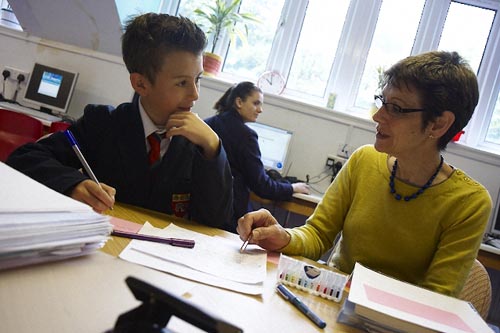
Fueled by international test scores which indicate that the UK is lagging behind other nations in education, the British education debate has focused on a number of issues. These include the nature of standardized exams and the weakness of the academic core requirements. The national exam system is costly and has lost public support in terms of academic quality (például. teachers teaching to the test). Nál nél 14, students can drop critical subjects such as the single sciences and foreign languages, and the study of these subjects has fallen dramatically in the past 10 év, with students from low income backgrounds being affected the most.
Professzor Michael Young (sociologist of education and Emeritus Professor of Education at the Institute of Education, University of London) hozzászólás:
At best, we still only educate between 40% és 50% of each cohort of young people. From the age of 14, the remainder are allowed to drift onto courses that lead them nowhere — neither to jobs nor to further study. We assume but do not admit that they are, to various degrees, uneducable, and so we don’t care that the courses they take, often carrying a spurious vocational label, are worthless. We also assume that they are incapable of benefiting from continuing their general education. No countries have solved this problem. Some, such as the Nordic, Német, as well as some Asian countries, achieve more than we do. Such inequalities are ultimately a political issue lying deep in the way most societies have developed. We are not powerless. Schooling is a universal right and this means much more than attendance. It is about the right of all young people to have access to ‘powerful knowledge’ — the knowledge that takes them beyond their experience and enables them to imagine alternatives.
Professor Young’s research interests are in knowledge, curriculum and qualifications. Legutóbbi könyve, Honosított tudás Back In, won second prize as UK Education Book of the Year (2010).
Milyen típusú oktatási rendszer lehetővé teszi egy ország, hogy az emberek készségek szükségesek a globális versenyre?
The influential idea of the ‘knowledge society’ means that each occupation will be under pressure to augment its quantum of conceptual knowledge. This is because generalizable innovation relies on conceptual knowledge and it is this kind of innovation that the global economy most prizes. It follows that if a country is to compete, its educational programs, whether general or vocational, must emphasize conceptual rather than contextual skills.
What is your view on standardized testing?
At best, standardized testing can provide a benchmark for how an education system is achieving relative to other systems. The PISA tests are a case in point. They are not perfect but there is a reasonable consensus that their measures can be trusted. Azonban, standardized testing can only inhibit the love of learning and stimulate a pedagogy which focuses on drill and practice. That is why they should be kept in the background and given a relatively low profile except for international comparisons.
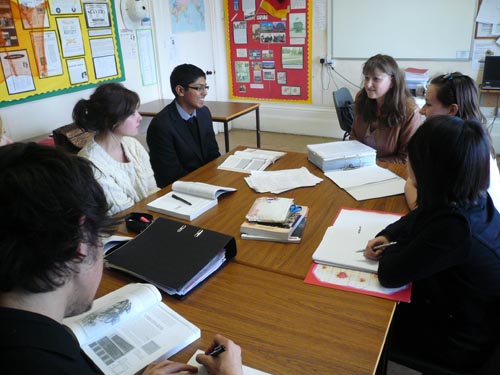
Ha általánosítás lehetséges, what elements are missing from the preponderance of current educational systems, mint a kritikus gondolkodás?
I do think generalizations are possible but I think ‘critical thinking’ is a completely meaningless and misconceived idea. It assumes that the process of criticism is independent of what is being criticized and the conceptual basis of the critiques. Any serious enquiry and any serious learning involves critique as one step in reaching a more reliable understanding but the meaning of critique will depend on the phenomenon being criticized, the concepts that are used to formulate the critique, and the domain of enquiry. Physicists, művészek, historians, and cabinet makers engage in critique of their and others’ practice and concepts, but there is nothing useful in abstracting a common notion of being critical.
There is no process or practice called ‘critique’ which people can learn to do and then apply in different contexts and across different domains. A similar argument could be made for problem solving: there are math problems, problems with bringing up children … and only the word is similar.
The other popular educational fad of the moment, ‘learning to learn,’ is equally vacuous, and potentially even more dangerous educationally. Egyrészt, any researcher, professional, craftsman/woman, musician, művész, and the best managers and administrators learn to learn and how to learn during their careers. Másrészt, if students come to treat ‘learning to learn’ as an important technique to be learned, it can lead them to distrust what they know, be open to every new learning (or training) opportunity, and lose confidence in what they know. When the new is better than the old just because it is new, this is the beginning of commercialism. Students need to learn to trust what they know but be open to its fallibility. There is no generic technique called ‘learning to learn’. Those who take learning seriously do it because they are motivated — either because it is part of their profession or because they find acquiring new knowledge something intrinsically worthwhile.
Mit lehet tenni, hogy jobban kezeljék a lelki egészség és a szellemi potenciál az egyes, amely úgy tűnik, hogy szenved a jelenlegi rendszerben?
I think people’s emotional well-being is harmed when they are bored by routine teaching to the test. Real learning and engaging with powerful new ideas in the humanities or the sciences involves a student’s emotional resources as well as their intellectual resources. It is when their intellectual resources become taken over by a testing machine that their emotional well-being is threatened.
Egy nagyobb szempontból, does your country’s definition of educational excellence take into account artistic and cultural achievements and the quality of life of individuals?
The answer is yes for some, and no for the majority. The elite schools, well resourced and with highly qualified teachers, often but not always with students boarding, offer a flourishing extra curriculum of arts, sporting and other activities where the pupils have large amounts of control over their own learning. A weaker version used to be a feature of state schools but has been undercut by new approaches to teacher workforce development where teachers work for a defined number of hours and are no longer encouraged to engage in extra curricular activities voluntarily. Creating opportunities to broaden students’ experience of different cultural activities requires high paid teachers and a broadening of their professionalism.


In A Global Search for Education, csatlakozzon C. M. Rubin és világhírű szellemi vezetők köztük Sir Michael Barber (UK), DR. Leon Botstein (US), DR. Linda Darling-Hammond (US), DR. Madhav Chavan (India), Professzor Michael Fullan (Kanada), Professzor Howard Gardner (US), Professzor Yvonne Hellman (Hollandiában), Professzor Kristin Helstad (Norvégia), Professzor Rose Hipkins (Új-Zéland), Professzor Cornelia Hoogland (Kanada), Mrs. Chantal Kaufmann (Belgium), Professzor Dominique Lafontaine (Belgium), Professor Hugh Lauder (UK), Professor Ben Levin (Kanada), Professzor Barry McGaw (Ausztrália), Professzor R. Natarajan (India), Sridhar Rajagopalan (India), Sir Ken Robinson (UK), Professzor Pasi Sahlberg (Finnország), Andreas Schleicher (PISA, OECD), DR. David Shaffer (US), DR. Kirsten Magával ragadó Are (Norvégia), Chancellor Stephen Spahn (US), Yves Theze (Lycee Francais US), Professor Charles Ungerleider (Kanada), Professzor Tony Wagner (US), Professzor Dylan Wiliam (UK), Professzor Theo Wubbels (Hollandiában), Professzor Michael Young (UK), és professzor Minxuan Zhang (Kína) mivel azok feltárása a nagy kép oktatási kérdés, hogy minden nemzet ma szembesül. A Global Search Oktatási közösségi oldal
C. M. Rubin a szerző két legolvasottabb internetes sorozat, amely megkapta a 2011 Upton Sinclair díjat, "A Global Search for Education" és "Hogyan fogjuk Olvasd?"Ő is a szerző három eladott könyvek, Beleértve The Real Alice Csodaországban.

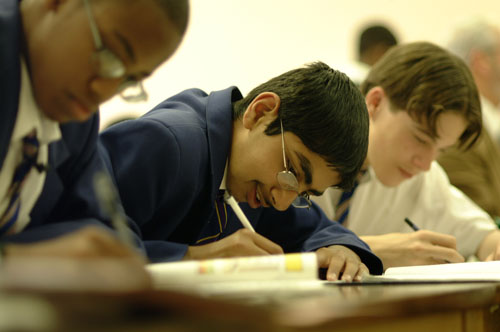
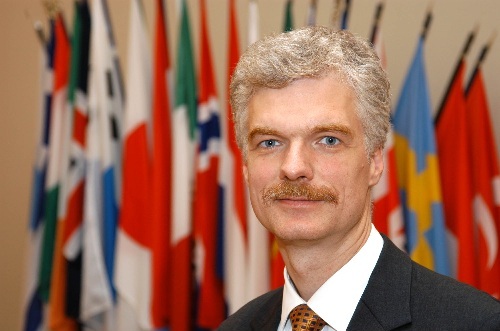
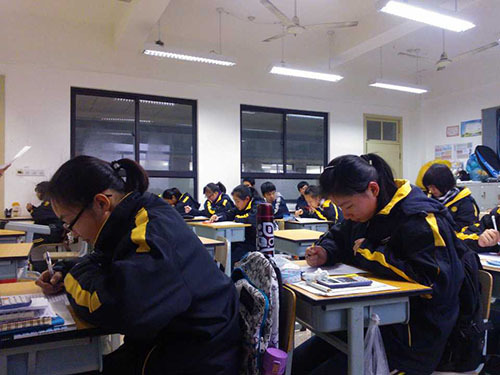
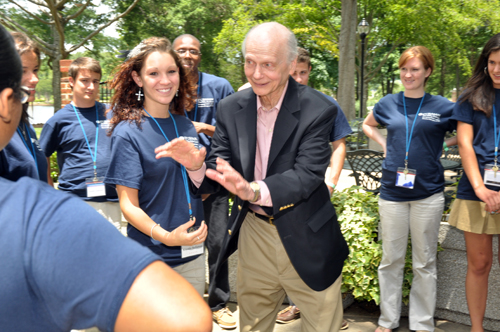
Legutóbbi hozzászólások